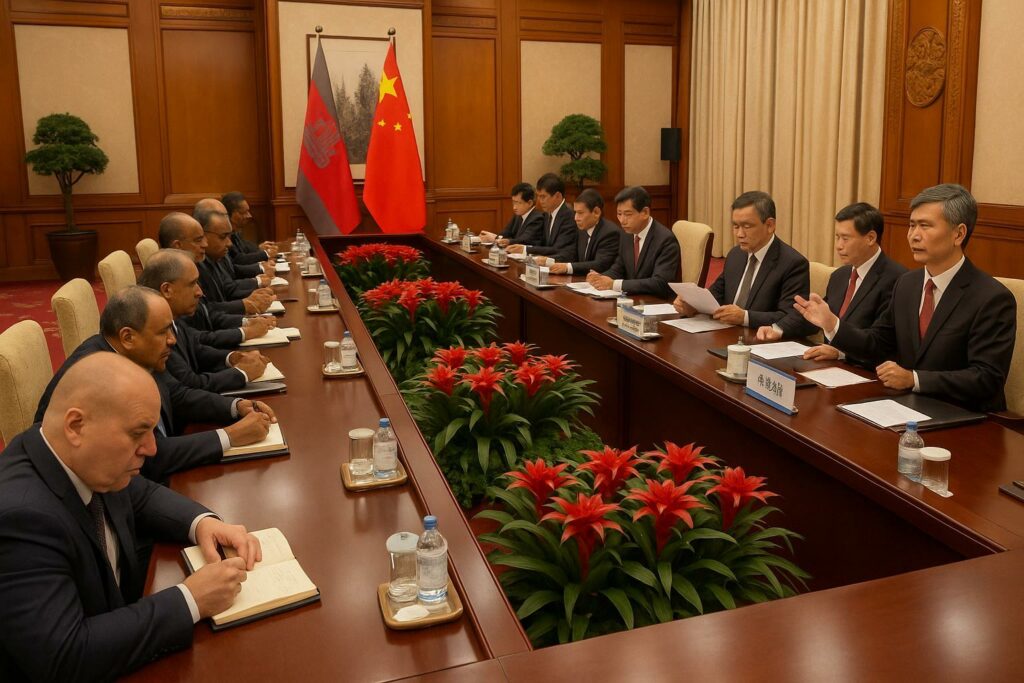Beijing’s public tribute to Moroccan stability
In the ceremonial setting of the Chinese capital on 19 September, Foreign Minister Wang Yi chose unusually direct language to salute “the leadership of His Majesty King Mohammed VI” and to link that leadership to what he described as Morocco’s enviable domestic stability. Coming from a senior member of the Chinese State Council, the compliment went beyond protocol. It projected Beijing’s conviction that Rabat represents, in a region beset by volatility, an anchor reliable enough to serve as an entry point for initiatives that require predictability, security and long-term perspective.
A partnership framed by shared developmental ambitions
The conversation between Wang Yi and Moroccan Foreign Minister Nasser Bourita revolved around a leitmotif: inclusive development. Both diplomats referred to the monarch’s continental initiatives, stressing their purported impact on African growth. The choice of vocabulary — development, inclusivity, stability — dovetailed with China’s own lexicon of win-win cooperation. By highlighting convergent narratives, Beijing and Rabat signalled an intention to align diplomatic calendars and investment agendas without renegotiating the fundamentals of their respective foreign policies.
Rabat’s endorsement of Xi Jinping’s flagship frameworks
Nasser Bourita reiterated what he called Morocco’s “consistent support” for the global initiatives advanced by President Xi Jinping, naming development, security, civilisation and governance as the four pillars deserving particular attention. That public endorsement served a dual purpose. Domestically, it reaffirmed Morocco’s multi-vector foreign policy, capable of engaging both traditional Western partners and ascending Asian powers. Internationally, it offered China an additional African voice ready to validate its thematic proposals on multilateral stages where language matters as much as votes.
The International Organization for Mediation: an embryonic forum
The meeting allowed Rabat to unveil its decision to join the International Organization for Mediation, an institution founded at China’s initiative and headquartered in Hong Kong. Although the organisation remains in its infancy, Morocco’s early membership suggests a calculated bet on preventive diplomacy as a cost-effective instrument of regional stability. By positioning itself among the first African entrants, the kingdom arguably seeks both to acquire a new platform for quiet negotiation and to broaden its visibility inside Asia’s legal-diplomatic circles.
From bilateral symbolism to continental ramifications
Observers noted that the statement issued after the talks linked Sino-Moroccan cooperation to “progress in Africa and beyond”. While devoid of numeric targets, the wording indicates an aspiration to translate diplomatic concord into tangible programmes. Whether framed as development corridors or mediation mechanisms, these programmes are likely to target the same fault lines Wang Yi enumerated: security deficits, uneven growth and governance gaps. In that sense, the Beijing encounter functioned less as a bilateral courtesy call than as a rehearsal for multilateral initiatives presented as benefiting the broader African landscape.
A calibrated message for a region confronted with headwinds
Africa’s current predicament — conflicts lingering, public finances strained, climate shocks multiplying — formed the unspoken backdrop of the exchange. By insisting on Morocco’s stabilising role, Wang Yi implicitly advanced China’s thesis that robust state institutions remain a prerequisite for meaningful development. For Rabat, the praise validated a diplomatic posture that leverages predictability as soft power. For Beijing, it delivered a narrative in which China and an African partner showcase pragmatic solidarity free from ideological overtones, echoing the vocabulary of win-win cooperation reiterated throughout the meeting.

